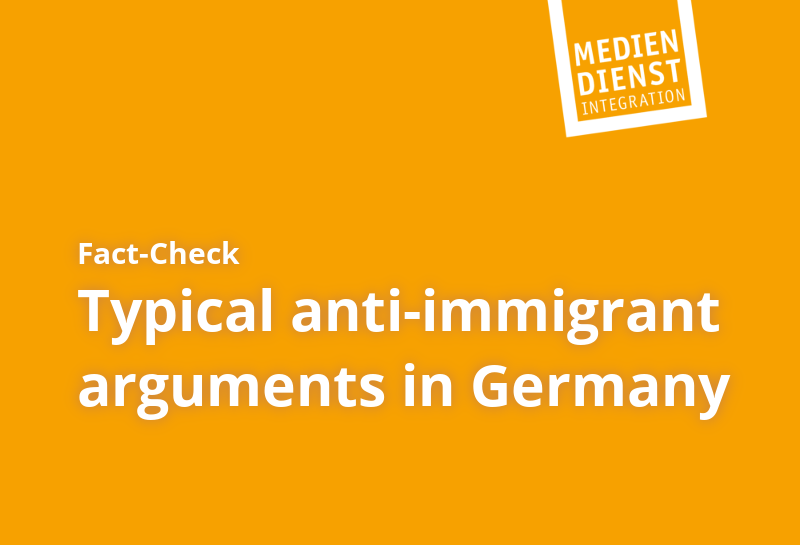Pegidaan be considered a local phenomenon born within the Dresden right-wing „scene“ and the number of Pegida-supporters outside of this area was extremely small. But according to recent opinion-polls, between 30 and 50 per cent of the German population sympathized with the movement. Politicians from almost all political parties claim that Pegida expresses “fears and resentments deeply rooted in the population”. It is therefore crucial to steer the discussion away from the psychological and emotional and back to a more factual approach.
-
Pegida claims that Germany is doomed to be „islamized“ pretty soon and that Christians may therefore be prevented to live according to their religion. Fact is: To this day there was not a single attempt from one of the Muslim communities in Germany to limit the freedom of non-Muslims. Moreover, in Germany live approximately 4 million Muslims (5 per cent of the population); only a limited number among them is strictly religious.Quelle
-
Right-wing populists claim that children of migrant families are unwilling to „integrate“ . Fact is: The number of young immigrants accessing higher education has been growing constantly over the last decades as the Commissioner for Migrants, Refugees and Integration points out in her latest report (in German).
-
Right-wing populists claim that most immigrants are a burden for the German welfare . Fact is: 2013 about 4,7 million foreigners were paying into the German pension fund. Immigrants contribute every year with over 20 billion Euro to the German GDP.Quelle
-
Right-wing populists claim that Germany draws more immigrants than any other country in the world with the exception of the USA . Fact is: The data of the OECD report claiming this only refers to OECD-states. If we consider migration on a global level it becomes apparent that the most relevant migration-flows worldwide are “regional” meaning that they take place within a single continent. With regards to refugees-figures, the UNHCRstates that Germany with its 200,000 asylum-seekers in 2014 lags behind countries like Libanon and Turkey. Last year they granted shelter – respectively – to 1.2 and 1.6 million Syrian refugees.
-
Right-wing populists claim that most immigrants are unemployed . Fact is: 91 per cent of the Germans with an immigrant background and 90 per cent of the people without a German passport are employed.Quelle
-
They claim that we have to regulate migration . Fact is: There is a regulation. In order to immigrate to Germany, people need to have a residence-title for specific purposes.
-
Right-wing populists claim that most immigrants come from Africa, the Middle-East and Turkey . Fact is: 64 per cent of the immigrants come from other EU-countries. Since 2006 there are more people emigrating to Turkey, than Turks immigrating to Germany.Quelle
-
Pegida claims that most asylum-seekers are actually escaping from poverty (and therefore don’t need any protection) . Fact is: Besides the fact that extreme poverty usually goes along with inhumane living conditions, we can say that – if we subtract „formal“ decisions – approximately one of two asylum-applicants were granted humanitarian protection in Germany.Quelle
-
They claim that young immigrants are particularly keen on starting a criminal career . Fact is: There is actually no difference between the crime rate among German and migrant youths.Quelle
-
The claim: Immigrants – especially Muslims – in Germany live in parallel societies . Fact is: 85 per cent of the migrants have regular contact with German natives, whereas only 4 per cent of the Germans without a migration background can say to entertain relationships with migrants.Quelle
-
Right-wing populists claim that migrants should start speaking German . Fact is: There is no reliable data about migrants’ language skills. According to an IAB-SOEP survey 63 per cent of the respondents who lived in Germany for more than 10 years said their German was either good or very good.Quelle
-
The claim is that Muslim men force their wives to wear a headscarf . Fact is: A study about Muslim life in Germany shows that 50 per cent of the Muslim women in Germany who are 66 or older wear a headscarf, 20 per cent of the 16 to 22 aged Muslim women do so. A study (in German) of the Konrad-Adenauer-Stiftung comes to the conclusion that most Muslim women wear a headscarf for religious purposes by their own choice.
-
Pegida claims that we must deport irregular migrants more consistently . Fact is: Many deportations are “Dublin-cases”. Summary proceedings would limit the right of case-by-case review. In most cases a deportation is not necessary because people leave the country voluntarily.Quelle
